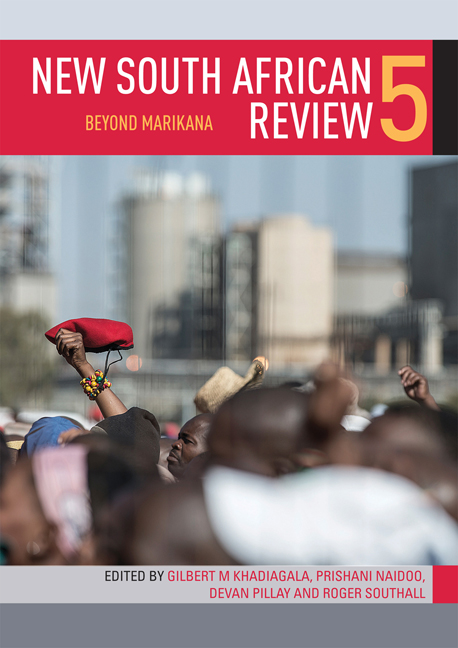Introduction: Political reconfigurations in the wake of Marikana
Published online by Cambridge University Press: 21 April 2018
Summary
On the weekend of 13-14 December 2014, two significant political events took place in South Africa. At a hotel in Kempton Park near Johannesburg, a national ‘people's assembly’ was convened by unionists from the National Union of Metalworkers of South Africa (Numsa) together with other activists (both independent and from a range of political formations), in preparation for the launch of the United Front. At the University of the Free State in Mangaung, the Economic Freedom Fighters (EFF) held what it also billed as its first national ‘people's assembly’. Both groups had emerged from dissatisfaction among Alliance members with the current leadership of the African National Congress (ANC). Both events borrowed, in the idea of ‘the assembly’, from the history of the struggle against apartheid and from contemporary experiments of collectives fighting against the various effects and manifestations of neoliberal policies around the world. It could, then, be argued that together they reflect a growing and deepening disappointment with, and critique of, existing political forms and practices that pass for democracy in South Africa today, and a desire for alternative ways of engaging collectively around common interests, needs and aspirations.
As I sat in the sea of yellow t-shirts in the Kempton Park assembly listening to presentations and discussions, fellow participants connected to social media kept me abreast of proceedings in Mangaung. Although there was so much familiar and similar about what was unfolding in both spaces, there was also a profound sense that something new was On the weekend of 13-14 December 2014, two significant political events took place in South Africa. At a hotel in Kempton Park near Johannesburg, a national ‘people's assembly’ was convened by unionists from the National Union of Metalworkers of South Africa (Numsa) together with other activists (both independent and from a range of political formations), in preparation for the launch of the United Front. At the University of the Free State in Mangaung, the Economic Freedom Fighters (EFF) held what it also billed as its first national ‘people's assembly’. Both groups had emerged from dissatisfaction among Alliance members with the current leadership of the African National Congress (ANC). Both events borrowed, in the idea of ‘the assembly’, from the history of the struggle against apartheid and from contemporary experiments of collectives fighting against the various effects and manifestations of neoliberal policies around the world.
- Type
- Chapter
- Information
- New South African Review 5Beyond Marikana, pp. 1 - 16Publisher: Wits University PressPrint publication year: 2015



